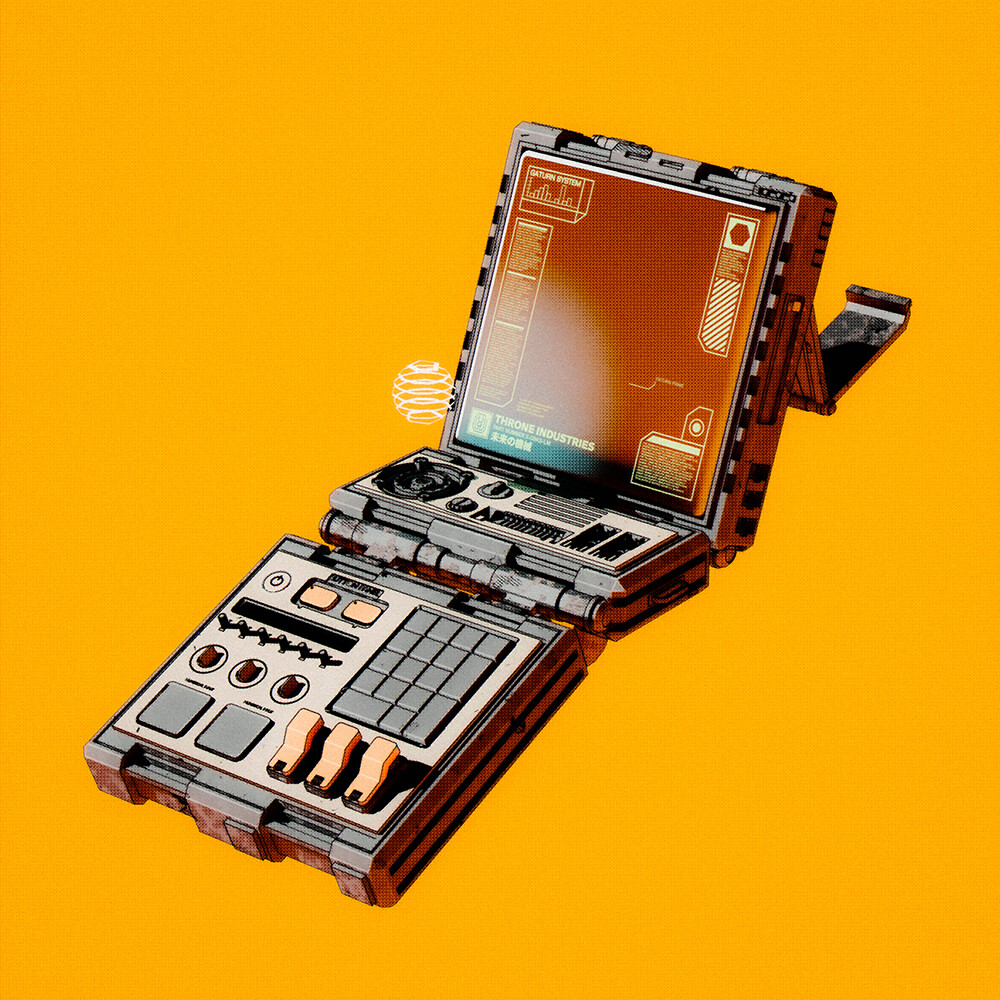Corporate Shogun



- Intent: Portable Computer & Splicing Device
- Image Source: Artist Credit
- Canon Link: Not Applicable
- Permissions: Not Applicable
- Primary Source: Not Applicable

- Manufacturer:
- Fukashi Electric
- Nakaioma Electronics
- Nakaioma Cyber Systems
- Fukashi Electric
- Affiliation:
- Market Status: Closed-Market
- Model: F80 MacroPad
- Modularity:
- Physical: None
- Digital: Compatible with most pre-existing software & script, can further be modified with any custom-written code.
- Production: Mass-Produced
- Material:

- Network Intrusion Countermeasures
- HoloNet Connectivity
- 480TB Standard Storage
- Gene-Lock
- Wireless Digital Connectivity
- Socketguard
- 46TB Standard RAM
- In-Built ElectroMag Defense Unit
- 15 Meter Deep Water Shielding
- Default Electronic Translator (Universal)

- Ol' Reliable: The F80 MacroPad does everything it says on the box and more (depending on the skill of the user) perfectly suitable for any number of ordinary civilian affairs, whether that be connecting to the HoloNet to read the news or sending a message to family on another world, or more advanced ones like working on demanding software/programs, the F80 can also be modified through it's highly malleable source code to conduct an even higher number of.. Not so legal slicing styles, certainly not by intention. Physically and digital tough, it can dish out as much damage as it can take (which means to say a lot) and is an all-round workhorse of a computer able to handle any task that needs doing.

- Not so Portable: Despite the concerted efforts of Fukashi Electric (a subsidiary of GalactiCom Holocommunications; a subsidiary of NAKAIOMA) to convince the galaxy that the F80 MacroPad is indeed a highly portable, easily carried machine, reality is not so kind to the corporation's marketing department, or the users of the F80 for that matter. Heavy and cumbersome, to say it is inconvenient to lug around all day would in some instances be an understatement. Although this was slightly mitigated near the end of the computer's development lifespan with the addition of folding and detachable components, so that it may be carried more like a briefcase, the F80 certainly won't fit in one's pocket.

The F80 MacroPad is a portable computer developed by the Nakaioma Electronics' and Cyber Systems divisions of Fukashi Electric. Somewhat recently released onto the civilian marketplace throughout civilized space, the F80 was intended to be a workhorse computer for the more digitally-savvy demographic of customers. Boasting impressive quantities of both RAM and general storage space, the computer's processing power is vast enough for it to handle heavily demanding software, complex encryption and decryption techniques and even (unofficially) sophisticated splicing techniques.
Outfitted with a variety of physical touchboard and holographic interactive options, the development process of the F80 was somewhat muddled as there was no single line of design direction that the team responsible for it went down due to a combination of disputes within the team as well as with their superiors up the corporate ladder.
Simultaneously intended to appeal to casual consumers (per the insistence of corporate) as well as meet the heavier requirements of professionals and hobbyists who needed a platform to work on, by the time of it's release it had ended up becoming some curious mix of the two, though leaning more heavily on the latter. Released to widely positive reviews from industry experts and less than enthusiastic ones from the casual customer, it would seem that the development team eventually won out over their corporate overlords in the long-term design of the F80, and it is now primarily popular with it's originally intended audience, though it has seen moderate success with more casually minded customers, they generally keep it at home.
Outfitted with a variety of physical touchboard and holographic interactive options, the development process of the F80 was somewhat muddled as there was no single line of design direction that the team responsible for it went down due to a combination of disputes within the team as well as with their superiors up the corporate ladder.
Simultaneously intended to appeal to casual consumers (per the insistence of corporate) as well as meet the heavier requirements of professionals and hobbyists who needed a platform to work on, by the time of it's release it had ended up becoming some curious mix of the two, though leaning more heavily on the latter. Released to widely positive reviews from industry experts and less than enthusiastic ones from the casual customer, it would seem that the development team eventually won out over their corporate overlords in the long-term design of the F80, and it is now primarily popular with it's originally intended audience, though it has seen moderate success with more casually minded customers, they generally keep it at home.







